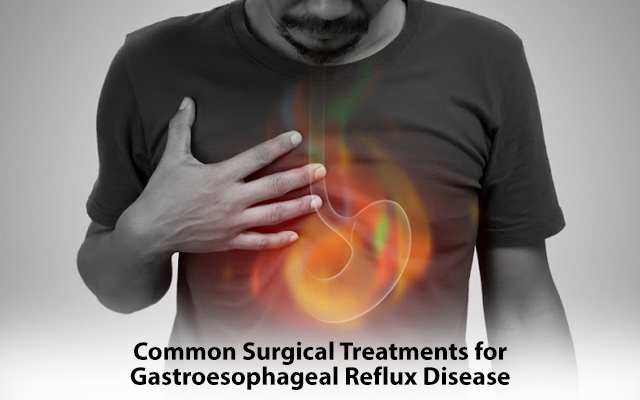March 28, 2025 | by Admin
Common Surgical Treatments for Gastroesophageal Reflux Disease
Gastroesophageal reflux disease (GERD) refers to a chronic condition where stomach acid or bile irritates the oesophagus, causing heartburn, chest pain, acid indigestion and difficulty swallowing.
Lifestyle changes and medications are generally the first line of treatment for GERD, and some patients may need surgery when these options fail to provide sufficient relief. Surgical interventions are often recommended for people with severe, persistent symptoms or complications, such as oesophageal damage, that cannot be controlled through non-invasive methods.
Types of Surgical Treatments for GERD
- Fundoplication: Fundoplication is known to be the most common surgery for GERD. This procedure involves wrapping the top of the stomach (the fundus) around the lower esophagus to strengthen the lower esophageal sphincter (LES), which prevents acid reflux. The LES acts as a valve between the stomach and the esophagus, but it can weaken in people with GERD, allowing stomach acid to flow back into the esophagus.
Fundoplication can be done laparoscopically (minimally invasive) for gastro reflux, which involves small incisions and a camera, resulting in shorter recovery times and less pain. This surgery can improve your digestive health.
- Esophageal Surgery for Complications: In some cases, GERD can cause more serious complications, such as esophageal ulcers, bleeding, strictures (narrowing of the esophagus), or a condition called Barrett’s esophagus, which can increase the risk of esophageal cancer. If these complications are severe, more extensive surgical care may be necessary.
- Esophagectomy: In extreme cases of GERD-related complications, the surgeon may remove a portion of the oesophagus or, in rare cases, the entire oesophagus. It is usually only performed when other treatments have failed and the patient’s esophagus is severely damaged.
- Endoscopic Therapy: An endoscopic procedure may be done for complications like ulcers. It is done with the help of an endoscope (a long, flexible tube with a camera) to remove scar tissue or dilate the oesophagus. You can book a consultation at our gastroenterology clinic in Kolkata to learn more about the surgery.
- Bowel Diversion Surgery (Rare): A bowel diversion surgery may be considered if GERD is highly severe and unresponsive to all other treatments. It involves rerouting the stomach’s contents away from the oesophagus entirely. It is a last-resort procedure for stomach acid reflux when all alternatives have been exhausted and should be discussed carefully with the doctor.
When Is Surgery Recommended?
Surgical treatment for GERD is considered when:
- Medications (such as proton pump inhibitors or H2 blockers) do not provide adequate relief.
- The patient is unable to tolerate medications or has side effects.
- GERD syndrome has caused severe complications, such as oesophagal bleeding or ulcers.
- The patient experiences a reduced quality of life due to persistent symptoms like heartburn or regurgitation.
To know if you need to undergo surgery, consult our doctors for gastrointestinal care at Petals Health, our multi-speciality clinic in Kolkata.
Conclusion
If you are considering surgery for GERD, it’s essential to discuss your options with the doctor to determine the best course of treatment based on your specific needs and condition. Reach out to the doctors at our gastroenterology clinic in kolkata to discuss your treatment options.
